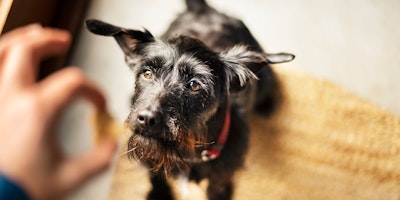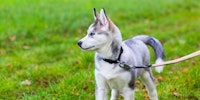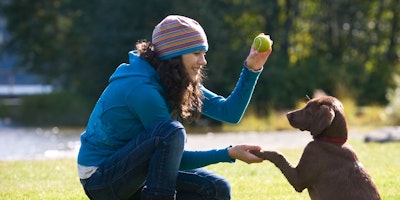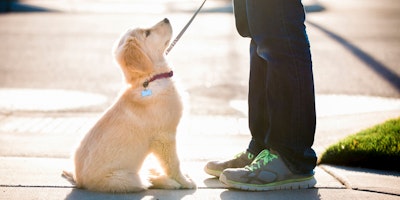
Puppy potty training is important. Not only will it save your floors, but it’s an essential step in teaching your puppy to be a good canine citizen.
A complete and balanced puppy food, as well as consistent mealtimes and planned potty breaks, are the keys to successful potty training. This will teach your puppy when to expect potty breaks and allow you to learn your puppy’s cues that he has to go.
Dr. Ragen T.S. McGowan, PhD, is a behavior scientist at Purina and will help set you and your puppy up for potty training success.
When to Start Puppy Potty Training
Once you’ve studied up on how to house train a puppy, the logical next question is “when?” The ideal time to start housetraining puppies is between 12 and 16 weeks of age. By this age, most puppies have enough bladder and bowel control for effective potty training.
“Remember, it’s never too late to potty train,” says Dr. McGowan. “If your dog joined your family after this age range, it may take a bit longer to transition him away from old habits, depending on his past experiences.”
Start potty training your puppy as soon as you bring him home. Take him right to the area outside where you want him to go potty. Let him sniff around and get familiar with the area and give him lots of praise as a reward immediately when he goes potty in that spot.
“Make a big production out of it with verbal cues like ‘good potty!’ and an excited tone of voice and/or give him some tasty treats,” recommends Dr. McGowan. “The more excited you are about your puppy going potty outside, the quicker he’ll learn it’s a good thing.
What Is the Best Way to Potty Train a Puppy?
When it comes to potty training, consistency, attentiveness and patience are key. Establishing a routine will make potty breaks more predictable for your puppy, and he’ll learn when to expect to go outside.
Watching him for cues that he needs to go out will also help minimize the chances for accidents in the house. Remember to keep things positive and fun.
Dr. McGowan recommends confining your puppy to a defined space when you cannot supervise him or watch his cues.
“It can be helpful to use a crate, set up a special room like a portion of a bathroom or laundry room blocked off with baby gates, or keep your pup on a leash near you, so he doesn’t wander off and have an accident while you’re distracted,” she advises.
When you can’t watch your puppy, restrict him to a small enough area so he won’t want to eliminate there. According to Dr. McGowan, “The space should be just big enough for him to comfortably stand, lie down and turn around.”
As you both become more established in your routine and your puppy learns to go potty outside only, you can gradually give him more freedom to roam around your house.
Puppy Potty Training Schedule
Having a schedule is crucial to potty training success. The more consistent you are with everything from mealtimes to potty breaks, the greater success you and your pup will have.
As you’re creating your puppy potty training schedule, keep this in mind: age typically corresponds to the number of hours of control. This means if your puppy is three months old, don’t expect him to hold it for more than three hours.
“While this is a general rule of thumb, keep in mind that every puppy is an individual. So, it’s best to take your puppy out every thirty to sixty minutes until you learn how long he can really hold it and work up from there,” says Dr. McGowan.
Here are a few times of day to let your puppy out as you begin potty training:
- After meals or drinking – feeding at the same times throughout the day will make things more predictable
- As soon as he wakes in the morning
- As soon as he wakes up from naps during the day
- Right before he is left alone
- Right before bed each night
- After playtime or exercise
- After spending time in his crate
Remember to take him outside to the same spot each time, as his scent may prompt him to go, and use the phrase “go potty” to encourage him.
Always stay with him outside, at least until he is fully potty trained (yes, even if it is raining!). This way, you can ensure he actually goes and reward him for going outside.
During training, praise him or give a treat each time he goes outside. Using this positive reinforcement will encourage this behavior.
Signs Your Pup Needs to Go
Every puppy is unique, so yours may follow some of these behaviors, but not others. Knowing the possibilities and learning which signals your puppy uses to tell you he needs to go potty will help make training go more smoothly.
When your puppy feels the urge to go, he may:
- Whine or bark
- Sniff while circling the room or his crate
- Scratch at the door
- Squat
If you see any of these signs, take him outside to his potty spot immediately.
Expect your puppy to have a few accidents in the house. It’s a normal part of housetraining. Here’s what Dr. McGowan recommends doing when they happen:
“If you catch him in the act, interrupt him! Make noise, clap your hands or say ‘Outside!’ then immediately take him to his potty spot. Praise him and give him a treat if he finishes outside.
“Never punish your puppy for eliminating in the house. If you find a soiled area, it’s too late to try to correct the behavior. Just clean it up and move on.”
“Clean the soiled area thoroughly. Puppies are highly motivated to continue soiling in areas that smell like urine or feces.”
It’s essential to remain attentive and patient during the potty-training process. The goal is to minimize the number of accidents in the house.
How Long Does it Take to Potty Train a Puppy?
Potty training doesn’t happen overnight. It can take several months or more before you can consider your puppy fully potty trained.
Various factors can also affect how long it takes to potty train your puppy, such as his breed size, age and where he eliminated prior to coming home with you.
The Best Way to Potty Train a Puppy Fast
The fastest way to potty train a puppy is to establish a routine and be as consistent as possible. Inconsistency may confuse your puppy, which will draw out the potty-training process.
“The key is to do everything you can to teach your puppy that outside is where he should always go potty,” says Dr. McGowan. “This means taking him out regularly, confining him when you can’t watch him and staying outside with him to make sure he actually goes. Of course, praise him immediately when he goes outside, so he learns quickly that going outside is what you want him to do!”
Troubleshooting
Setbacks are inevitable with any kind of training. If you run into any of the below issues, you can get back on track with these tips.
- Urinating in the same spot: If your dog has an accident inside and then continues to relieve himself in that spot, you need a more effective cleaning solution. Look for an enzymatic cleanser to eliminate the odor and make the location less appealing.
- Going all over the house: There are a couple of possible causes for this behavior. First, you may have given your puppy too much freedom too soon. If that’s the case, go back to a more restricted area for several days. Small and toy breeds struggle with bladder control longer, so you may need to take him out more often to help him get the hang of things.
- Soiling in his crate: If your dog is soiling in his crate, there are a few possible reasons. The crate may be too big, in which case you either need to downsize or get a pet-safe partition to decrease the available space. If, however, your dog came from a pet store or shelter where he spent most of his time confined to small spaces and had no other place to eliminate, crate training will take more time. Patience, persistence and consistency are key to helping him learn.
There are many commands puppies need to learn to become good canine citizens, such as “sit,” “stay,” and “heel.” “Go potty!” is just as important.
Potty training is at the top of every new pet owner’s priority list. The sooner your puppy is potty trained, the happier everyone will be. Using the above tips will help the process go smoothly.
If your dog is fully potty trained but suddenly starts having accidents, or if you’re struggling with potty training, consult your veterinarian, as there may be other issues that need to be addressed.
Get more training tips from our experts on our Pet Expertise page.
Related articles


Be Rewarded for Your Purina Purchases
Earn and redeem points for Purina products with myPurina app.


